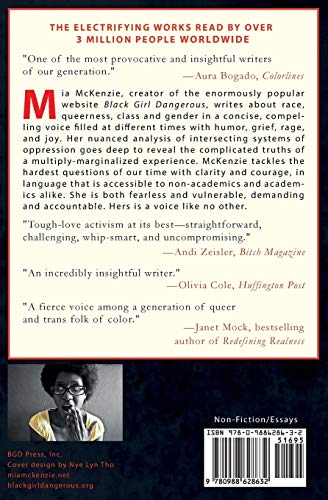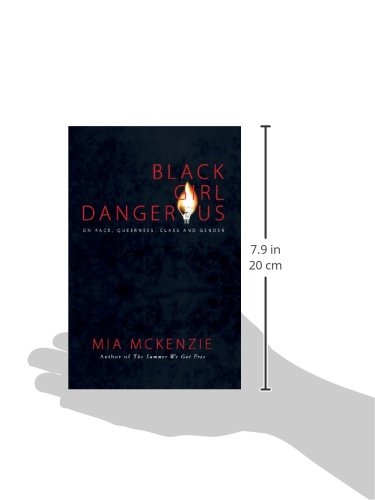Customer Services
Copyright © 2025 Desertcart Holdings Limited




Full description not available
A**R
A Powerful Voice Against Silence
It is very rarely that one finds a book that is both equally as passionate and educational as Mia McKenzie’s Black Girl Dangerous. This book is a compilation of her blogs based off of her Tumblr page that soon grew wildly popular and not only expanded to a broad range of readers but also quickly accumulated other brilliant writers who joined her movement of breaking silence. Mia McKenzie’s writing is the embodiment of intersectionality and her book should be required for any WGS class, any sociology class, or basically just any class in general because so much can be learned from every one of her pieces. The best part of this book is Mia McKenzie’s writing style. She is straightforward, brutally honest, and combines educational writing with sarcasm which is highly effective in getting her points across. Her strength in writing is evident as all of her pieces transition effortlessly from originally being created in a blog format to gracefully presenting themselves on pages of a book. The pieces calling out white privilege are also one of the strongest parts of the book. I have never read a book that calls out and explains white privilege as honestly and unapologetically as she does. I think every white person should read her sections about privilege because the way she addresses it is much more powerful than any definition based, watered down version of white privilege found in any sociology or women’s study text book. In her essay about allyship, she claims that we have lost genuine allies because we refuse to address privilege and become an ally to selflessly support the individual instead of one’s own self-image or personal agenda to eliminate acclaimed ‘white guilt’. This book is a much needed space to honestly call out privilege and call in those who are willing to put their own selfishness aside and learn how to check privilege and become an actual ally. And throughout discussing the racism, homophobia, and misogyny in the world Mia McKenzie still reminds readers that one cannot forget to love themselves nor others facing the same struggles. A beautifully powerful message to the LGBTQ community when the rest of society deems any deviation of white, sexually hetero-normative love as evil. In order to understand anything about women’s studies, one must realize that we have to break out of the old school, cookie-cutter mode of feminism created by white, middle class women. We must introspectively examine the issues that EVERY woman is facing due to the white, straight patriarchal powers because if we are to truly embrace solidarity that means shedding the armors of white privilege and socially accepted, dominate stories. Black Girl Dangerous is a breath of fresh air from “non-offensive” textbooks because it addresses what must be addressed and in a way that it needs to be called out—in utter, unfiltered truth. Being that a lot of women studies spaces are still dominated by white, heterosexual or cisgender women, this book is crucial into seeing studies on intersectionality and true equality being spoken on and played out in the real world. I highly recommend this book and for anyone who claims to be a feminist or interested in women’s gender and sexuality studies, it is a must read.
A**S
An Alternative to Traditional Feminist Texts
AMJ - Mia McKenzie’s Black Girl Dangerous is an anthology of journal-like entries which were originally posted on the author’s personal blog, which was of the same name as the book, as a sort of activist performance of breaking the silence. It is a collection of selected entries, which are paired with the author’s retrospective analyses of the original posts and responses. Each entry consists of a short synopsis of events which the author noted via personal encounters, social media, and national news networks, as well as a personal analysis of those events as they pertain to issues of gender, sexuality, and race through the lens of a queer Black feminist. As a WGSS student, I found the book to be very insightful and provoking through its presentation of an intersectional alternative to the traditional heteronormative White feminism which has often been taught in WGSS courses. I also found it to be helpful and inspiring through its exemplification of a tangible version of feminist activism which is most feasible and effective in the digital age of the 21st century. Additionally, the author’s ability to be reflective and self-critical at times within the book is quite refreshing. I especially liked the entries in which the author called out her own friends and communities, questioning their responsibility in perpetuating some of the issues that are discussed. I felt that it offered a more realistic vision of feminism which acknowledged humans as imperfect and ever-changing beings, rather than flawless idols of social justice and moral upstanding. Overall, its greatest strength is its authenticity, specifically its conversational tone and personal approach. It makes feminism more appealing and far less intimidating in a world where the “F” word has been stigmatized. However, this same strength is the greatest weakness of the book, too. While the book provides an excellent example of realistic everyday feminism, it does not provide scholarly research based conclusions. Due to the nature of the writing style, there are not citations or references to solid statistics, studies, definitions, or concepts that are pivotal to any functional feminist study, discourse, or practice of WGSS subjects. Additionally, the information provided is primarily opinion based and must always been assessed with consideration to the author’s biases. This relates to another issue, which McKenzie herself mentions in the opening of the book: it does not include the dialogue and commentary amongst readers of the entries on the blog. Therefore, the response that the entries elicited is not fully understood, the discursive context in which certain things were said is lost, and the progression of ideas which is often achieved through open responsive dialogue is unavailable. Alone, the book simply does not hold up; it can only really be appreciated if some prior familiarity to concepts and events are present.Ultimately, it is a worthwhile investment for anyone studying WGSS. Although it does not establish a foundation for feminism, it does function as a rare example of ways in which feminism can be expanded, personalized, and critiqued.
B**R
Very sobering
I would recommend this to anyone who's interested in learning more about Western racism or intersectional identity. If you're trying to Do Better in your activism this will give you a good place to start. Try not to get angry. Get angry anyways. Dissect why you feel that way. Do Better.
A**R
Five Stars
A must read.
M**Y
Buy this book.
McKenzie's take on all sorts of matters is important. It's reassuring she has been able to amplify her voice and it's for everyone's benefit to support her.
Trustpilot
2 weeks ago
2 months ago